|

On eBay Now...
"2nd Earl Granville" Granville Leveson-Gower Signed Free Frank For Sale
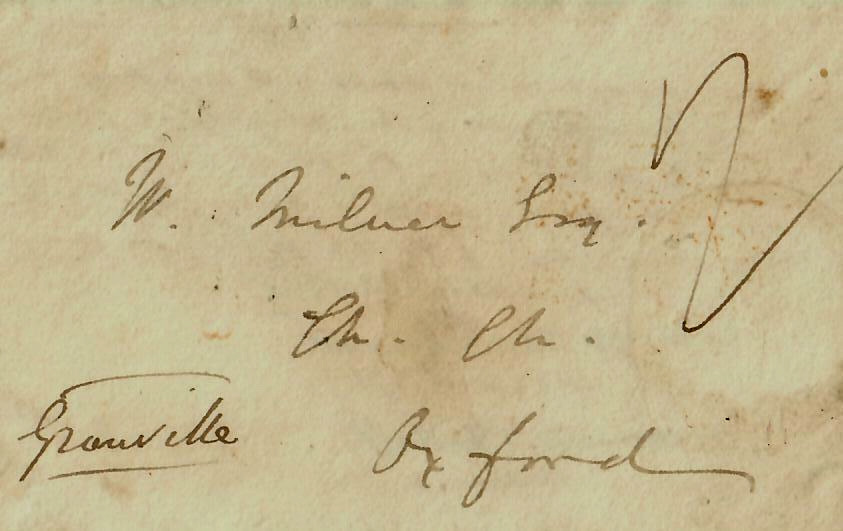
When you click on links to various merchants on this site and make a purchase, this can result in this site earning a commission. Affiliate programs and affiliations include, but are not limited to, the eBay Partner Network.

"2nd Earl Granville" Granville Leveson-Gower Signed Free Frank:
$399.99
Up for sale a RARE! "2nd Earl Granville" Granville Leveson-Gower Signed Free Frank.
ES-6334 Granville George Leveson-Gower, 2nd Earl Granville, KG PC FRS (11 May 1815 – 31 March 1891), styled Lord Leveson until 1846, was a British Liberal statesman[1] from the Leveson-Gower family. In a political career spanning over 50 years, he was thrice Secretary of State for Foreign Affairs, led the Liberal Party in the House of Lords for almost 30 years and was joint Leader of the Liberal Party between 1875 and 1880. He is best known for his pacific stewardship of Britain's external relations, 1870–74 and 1880–85, in co-operation with his best friend, Prime Minister William Ewart Gladstone. His foreign policy was based on patience, peace, and no alliances; it kept Britain free from European wars and improved relations with the United States after the strain during the American Civil War. Leveson-Gower was born in London, the eldest son of Granville Leveson-Gower, 1st Earl Granville, by Lady Harriet Cavendish, daughter of William Cavendish, 5th Duke of Devonshire. His father was a younger son of Granville Leveson-Gower, 1st Marquess of Stafford, by his third wife; an elder son by the second wife (a daughter of the 1st Duke of Bridgwater) became the 2nd Marquess of Stafford, and his marriage with the daughter and heiress of the 18th Earl of Sutherland (Countess of Sutherland in her own right) led to the merging of the Gower and Stafford titles in that of the Dukes of Sutherland (created 1833), who represent the elder branch of the family. He was educated at Eton and Christ Church, Oxford. Leveson-Gower went to Paris for a short time under his father, and in 1836 was returned to parliament in the Whig interest for Morpeth. For a short time he was Under-Secretary of State for Foreign Affairs in Lord Melbourne's ministry. From 1841 until his father's death in 1846, when he succeeded to the title, he sat for Lichfield. In the House of Lords he distinguished himself as a Free Trader, and Lord John Russell made him Master of the Buckhounds (1846). He became Vice-President of the Board of Trade in 1848, and took a prominent part in promoting the Great Exhibition of 1851. In the latter year, having already been admitted to the cabinet, he for about two months at the first of the year succeeded Palmerston as Secretary of State for Foreign Affairs until Russell's defeat in 1852; and when Lord Aberdeen formed his government at the end of the year, he became first Lord President of the Council, and then Chancellor of the Duchy of Lancaster (1854). Under Lord Palmerston (1855) he was again president of the council. His interest in education (a subject associated with this office) led to his election (1856) as chancellor of the University of London, a post he held for thirty-five years; and he was a prominent champion of the movement for the admission of women, and also of the teaching of modern languages. From 1855 Lord Granville led the Liberals in the Upper House, both in office, and, after Palmerston's resignation in 1858, in opposition. He went in 1856 as head of the British mission to the tsar's coronation in Moscow. In June 1859 the Queen, embarrassed by the rival ambitions of Palmerston and Russell, sent for him to form a ministry, but he was unable to do so, and Palmerston again became prime minister, with Russell as foreign secretary and Granville once again as president of the council. He received an honorary degree from Cambridge University in 1864.[3] He retained his office when, on Palmerston's death in 1865, Lord Russell (now a peer) became prime minister and took over the leadership in the House of Lords. Granville, now an established Liberal leader, was made Lord Warden of the Cinque Ports.[2] As Lord Warden, he was appointed Honorary Colonel of the 1st Cinque Ports Artillery Volunteers on 23 April 1866.

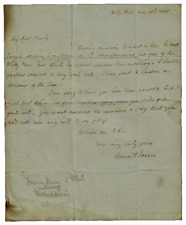
"2nd Earl of Mountnorris" George Annesley Hand Written Letter Dated 1835 $349.99
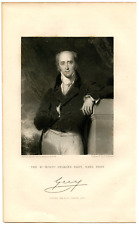
CHARLES GREY, 2ND EARL GREY, British Prime Minister, 1832 Steel Engraving 9642 $20.00
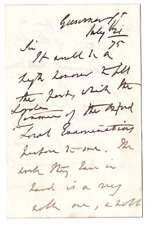
Dudley Ryder, 2nd Earl Harrowby Signed Letter 1875 / Autographed Politician $12.99
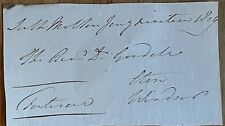
British Politician and Lord of Ireland Hugh Fortescue, 2nd Earl Autograph $19.95

RARE “2nd Earl of Selborne" William Palmer Clipped Signature $48.99
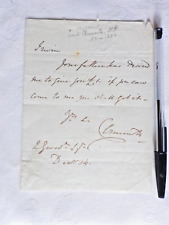
2nd Earl of Leitrim, Nathaniel Clements, Signed Note $15.27

"2nd Earl of Balfour" Gerald Balfour Clipped Signature $349.99

"2nd Earl Granville" Granville Leveson-Gower Signed 2X4 Card $279.99
|